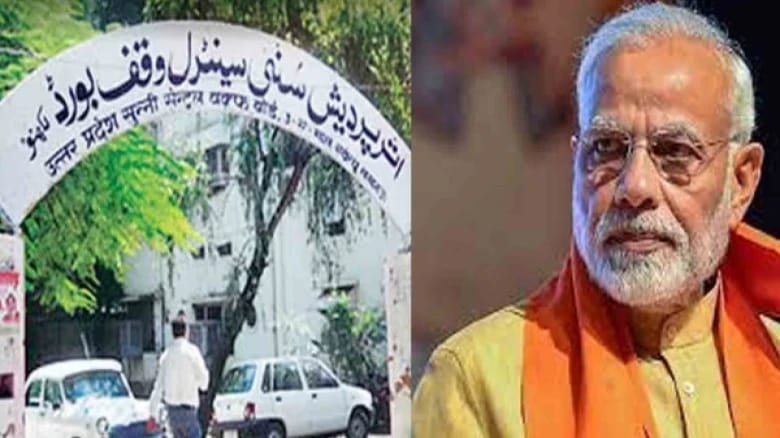In India, after the military and railways, the largest amount of land is under the Waqf Board. The properties of the Waqf have always been a thorn in the side of the Sangh and the Hindutva lobby. Ending the powers of the Waqf Board has always been an agenda of the RSS. Media reports claim that after major decisions like the Babri Masjid and Article 370, it is now the turn of the Waqf Board and the Waqf Act. The Modi government wants to make major changes in the Waqf Board, and according to the media, 40 major changes can be made in the Waqf Act. Asaduddin Owaisi, questioning the government’s intentions, says that the government should have first informed Parliament, but it leaked this news to the media. It is evident that an attempt is being made to create misunderstandings and poison about the Waqf Board and its powers through the media first.
The Waqf Board is an institution that oversees, manages, controls, and administers properties, lands, and assets donated by Muslims for charity. For this, the “Waqf Act” law was formally made in 1954, which was replaced by a new “Waqf Act” in 1995. In 2013, some amendments were made to this law to ensure the protection of Waqf properties.
First, let’s understand what the Waqf Act is. The key laws related to Waqf in India are as follows:
- Waqf Act, 1954:
- This was the initial legislation for the administration and management of Waqf properties in India.
- It provided for the establishment of central and state Waqf Boards to manage Waqf properties.
- The aim of this law was to use the income from Waqf properties for charitable or religious purposes.
- Waqf Act, 1995:
- This act replaced the 1954 Waqf Act to improve the administration and management of Waqf properties.
- It provided for the establishment of the Central Waqf Council, which advises the government on Waqf matters and monitors the performance of state Waqf Boards.
- It defined Waqf, Waqf property, and Mutawalli (manager of Waqf properties).
- It mandated the recording, surveying, and periodic inspection of Waqf properties.
- The aim of this law was to prevent the misuse and mismanagement of Waqf properties.
- Waqf (Amendment) Act, 2013:
- This amendment made several changes to the Waqf Act, 1995 to further improve the administration and management of Waqf properties.
- It increased the powers of the Central Waqf Council and state Waqf Boards.
- It increased penalties for unauthorized occupation or encroachments on Waqf properties.
- It mandated the publication of lists of Waqf properties and the creation of a central database to ensure better transparency and accountability.
- It made arrangements for the recovery of Waqf properties under illegal occupation.
These laws collectively ensure that Waqf properties are managed effectively and used for their intended charitable or religious purposes, and prevent misuse and encroachments. However, as Waqf properties and lands increase over time, the Sangh lobby is worried. Due to the high importance of charity in Islam, a large number of Muslims donate their properties to Waqf so that the board can use them for religious works, helping the poor, and the welfare of Muslims, for which they gain spiritual merit. But the increasing properties of Waqf are used by the Sangh and the Hindutva lobby to propagate that through Waqf laws, the Waqf Board usurps the lands of non-Muslims.
In fact, under the “Waqf (Amendment) Act 2013”, the Waqf Board has the authority to claim its occupied properties, and the party in possession of the Waqf properties must prove that it does not belong to the Waqf. A special tribunal was established to hear all such disputed matters, excluding the judiciary. It is this power of the Waqf Board that worries the Hindutva lobby the most, and it is propagated that the board claims any property as its own and usurps it. Since a special tribunal instead of the judiciary is responsible for resolving these matters, the Hindutva lobby also alleges that decisions in these tribunals are made in favor of the board.
Similarly, the identification and designation of Waqf properties are done by the Survey Commissioner, who is appointed by the government. The Survey Commissioner submits his recommendations to the government, which issues a gazette. If no objections are raised within a year, the properties are transferred to the Waqf Board.
The Modi government is now preparing to strip these powers. If the powers of the Waqf Board are taken away, it will become extremely difficult to protect Waqf properties, lands, and assets. It is speculated that under the new amendments to the Waqf Act, instead of the party in illegal possession, the Waqf Board will now have the responsibility to prove its ownership. This means that under the new amendments, the path will be opened for claims on Waqf properties, turning the whole matter upside down. Previously, the burden of proof was on the party in possession; now, the Waqf Board will have to prove ownership. In fact, even the already approved Waqf properties can be challenged, and the Waqf Board will have to prove their ownership. This means that the Waqf Board will have to re-verify all its current properties.

The properties under the Waqf consist of about sixty to seventy percent mosques, madrasas, dargahs, cemeteries, and Eidgahs. This will give strength to the Hindutva claims that ancient mosques, madrasas, dargahs, cemeteries, and Eidgahs were built by demolishing temples. Almost every state has a Hindutva lobby claiming that some mosque, madrasa, dargah, cemetery, or Eidgah was built by demolishing a temple. Under the new amendments to the Waqf Act, the government will order surveys of all such disputed matters, and the results of these surveys can be understood based on the current situation and the government’s intentions. Based on these survey results, the government will have the authority to decide whether the properties are Waqf or not, meaning the executive, not the judiciary, will be the decision-maker, which is detrimental to justice.
The Modi government wants to strip the autonomy of the Waqf Board and use Waqf properties against the will of the donors, which is against the right to religious freedom. To make decisions regarding Waqf properties, a two-thirds majority of Waqf Board members is required, meaning that to sell, gift, lease, etc., Waqf properties, a two-thirds majority of the board members must agree. Each state has a Waqf Board, and the state government nominates one or two members to the board. Then, the Muslim MLAs, Muslim MPs of that state are included in the board. Similarly, a Muslim member of the state bar council is also included in the board, and some Islamic scholars and one Mutawalli are also included in the board. The Modi government wants to change this method of appointing board members, and it is speculated that the Modi government will pave the way for non-Muslims to be members of the board, allowing the BJP to include its supporters in the Waqf Board. According to media reports, the District Magistrate will also be given responsibilities in the board, and efforts will be made to ensure an increase in the number of women in the board.
In any case, if Muslims want to save the Waqf Board, the Waqf Act, and Waqf properties, the senior leadership and organizations of Muslims should start preparing for it now, talk to all opposition parties about the amendments to the Waqf Act, and try to stop this bill from being passed in Parliament. It is still possible to stop it in the Rajya Sabha, provided there is no betrayal from the opposition parties. This is a test, for secular parties to prove they are truly secular, and for Muslim leaders and organizations who asked Muslims to vote for them during elections. This is the first major step of the Modi government’s third term; it will be interesting to see if the strong opposition can stop Modi’s advancing steps or be crushed themselves.


